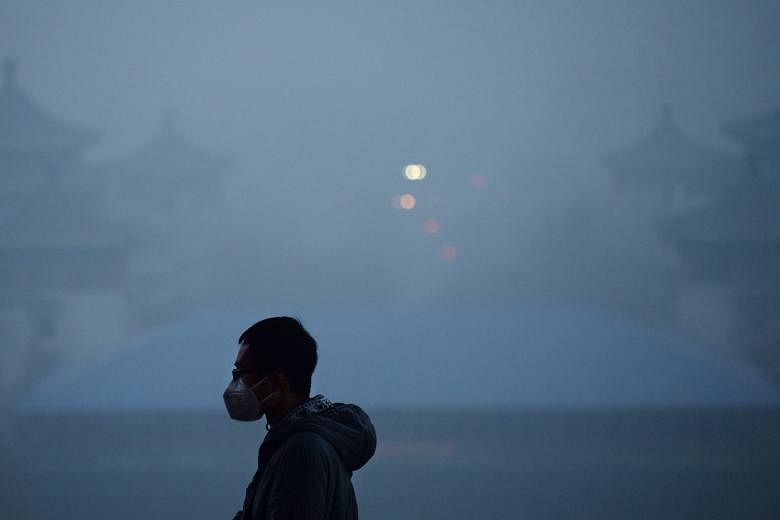While democracies usually struggle to get anything decided and done, autocracies seem unencumbered. As political scientist Samuel Huntington famously declared: "The one thing that communist governments can do is govern; they do provide effective authority."
Hence, it's logical to assume that, in China, as soon as the authoritarian leadership sets its mind on certain goals, the goals will be met in due time. Beijing needs only to change the targets it assigns to local officials throughout the country. Once targets change, so will the priorities and actions of the local governments, right?
Wrong. Even in a top-down command system, things are in fact not that simple.
Undoubtedly, China seems to have emerged as a key global leader in fighting climate change. After United States President Donald Trump announced his decision to withdraw from the Paris Agreement, Chinese Premier Li Keqiang reiterated that "China will stand by its responsibilities on climate change".
The top Chinese leadership is serious about tackling climate change. The latest Five-Year Plan, which guides social and economic development for the 2016-20 period, places environmental stewardship at centre stage. The many ambitious targets include reducing carbon intensity (carbon dioxide emissions per unit of gross domestic product) by 15 per cent and energy intensity by 20 per cent by 2020, improving air quality in hundreds of cities, and more.
Will these targets get implemented? This is where local and bureaucratic politics comes in, even in an ostensibly centralised state like China.
In the Chinese political system, local officials are evaluated based on targets set by the next higher level of government. Each target is assigned points, adding up to a total of 100. The career prospects and bonuses of local leaders are tied to their ability to meet annual targets.

Traditionally, economic targets were given the top priority, and concretely measured in terms of GDP and revenue growth. Not surprisingly, economic targets accounted for the majority of the points for evaluation. Hence, they were dubbed "hard targets". Lesser social goals such as forest conservation were "soft targets". This largely explains local officials' single-minded pursuit of rapid growth, even at huge social costs.
If Beijing wants local officials to pay more attention to climate change mitigation, it seems logical to decrease the weight of growth targets and elevate that of environmental targets. As economist Stephen Green stated: "China's pollution problem can be solved only if measurable environmental targets are prioritised."
This opinion is widely echoed in academic literature as well. One study concluded that "explicitly rewarding cadres with promotions for improving environmental conditions" is the way to go.
Such policy recommendations would make complete sense if local officials were given only a small number of targets. In such a scenario, adding environmental targets would tip the scales and force them to re-evaluate their priorities.
The problem, however, is that China's officials today are overloaded with numerous targets. In my book, How China Escaped The Poverty Trap, I provide a detailed comparison of targets assigned in the 1990s and 2009. This comparison shows a stark pattern of "mission creep".
For instance, in 1989, township leaders were assigned only six targets, with economic targets taking up the lion's share of evaluation points, all packed into one page. By 2009, the list of targets had ballooned to five pages. Environmental targets were included, but so were targets for education, hygiene, public order, birth control, petitions, party-building and you-name-it. Altogether, there were 112 detailed targets. Further, there was a list of 27 "penalty" items that did not add points; yet, failure to meet them would result in penalties.
Environment-related targets were assigned three points. Higher-level governments could marginally increase the weight, but could not raise it dramatically to, say, 30 points. Bear in mind that there were many other targets for which points had to be assigned, and economic goals continued to be the highest priority. Even if the number of points for environmental targets were increased, local officials still had to attend to numerous other tasks, despite limited resources and time.
Moreover, it is nearly impossible to fairly assign credit and blame for environmental targets such as air quality, which is now a mandatory target in many cities. Unlike industrial output, air quality is affected by spillovers from surrounding locations, which local officials cannot directly control.
Worse, when over-pressured by targets that cannot feasibly all be met, local officials might resort to extreme or deceptive measures. Recently, officials from a district-level environmental protection bureau in Shanxi province were indicted for tampering with devices that measured air quality. Some cities imposed periodic blackouts in order to meet targets for reducing energy consumption.
Classic theories of public administration tend to focus on capitalist democracies. In democracies, accountability is achieved primarily through elections. Politicians who fail to meet their constituents' goals might be voted out of office. In China's authoritarian system, there are no elections. Instead, targets provide the accountability mechanism; they signal what the goals of appointed officials should be. But when there are many targets and every target is important, the system loses its signalling function.
Targets are as politically fundamental to autocracies as elections are to democracies. Yet, our understanding of how targets are designed and function in practice is but a small fraction compared with our abundant research on elections.
Beijing's policy wand is powerful. But making new policies will not magically fix China's environment. Both students of public administration and climate change must look into the practical challenges of implementing the central government's goals in China.
- The writer is Associate Professor of Political Science at the University of Michigan, Ann Arbor. This article was first published in Public Administration Review, a professional journal dedicated to advancing theory and practice in public administration.

